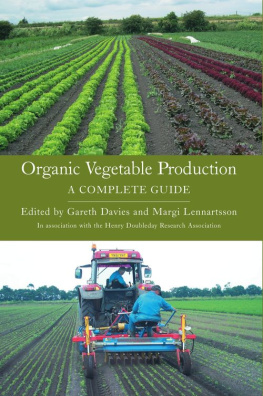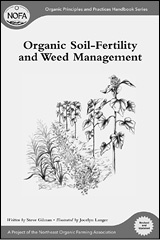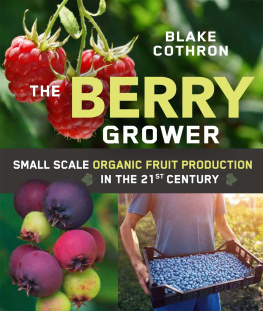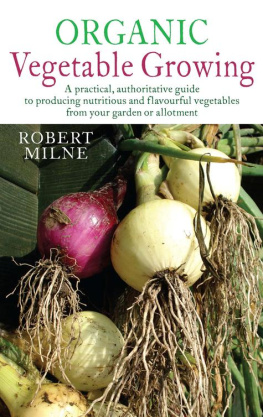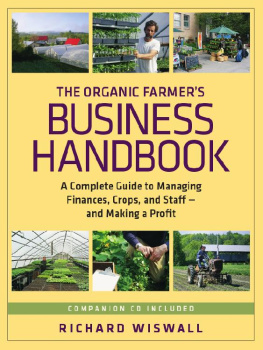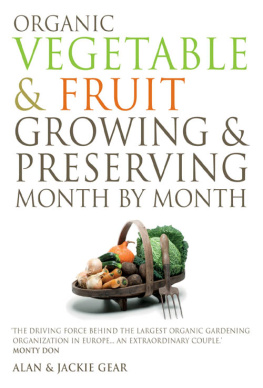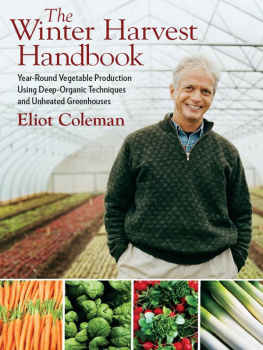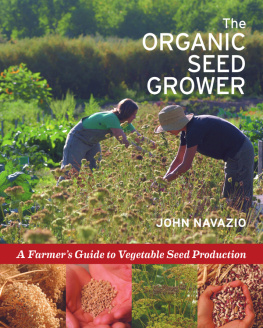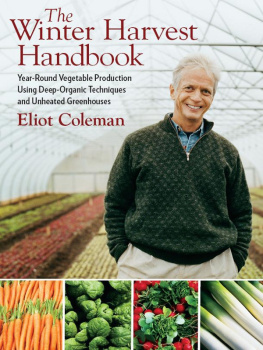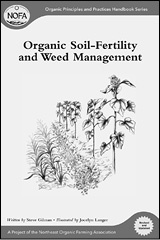First published in 2005 by
The Crowood Press Ltd
Ramsbury, Marlborough
Wiltshire SN8 2HR
www.crowood.com
This impression 2012
Garden Organic (formerly The Henry Doubleday Research Association) 2005
All rights reserved. No part of this publication may be reproduced or transmitted in any form or by any means, electronic or mechanical, including photocopy, recording, or any information storage and retrieval system, without permission in writing from the publishers.
British Library Cataloguing-in-Publication Data
A catalogue record for this book is available from the British Library.
ISBN 978 1 84797 440 2
ACKNOWLEDGEMENTS
The editors wish to thank the numerous people involved in bringing this book to publication and we are grateful to all of the authors for their numerous contributions. In writing and editing the book we have drawn on our collective experience in organic research over the previous decade or so and as such we have relied on the knowledge, experience and advice of many people in the organic movement and beyond. To them all, too numerous to mention, we would say thank you. A special mention must go to DEFRA whose funding for organic research has underpinned much of Garden Organics (formerly HDRA) research work. We would also especially like to thank all the organic farmers and growers with whom Garden Organic has worked, and who have willingly contributed their stories, knowledge, experience and time to our research programme. They have made a real contribution to the information contained in this book, and without them the book would not have been possible.
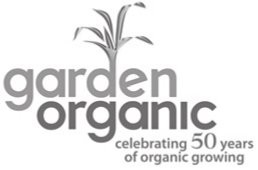
Garden Organic formerly the Henry Doubleday Research Association
Contents
Foreword
Roger Hitchings, OAS
Gareth Davies, Margi Lennartsson
Anton Rosenfeld, Phil Sumption, Gareth Davies
Gareth Davies, Phil Sumption, Simon Harlock, Thalia Nunis
Paul Gosling, Francis Rayns
Becky Turner
Gareth Davies
Thalia Nunis, Simon Harlock
Phil Sumption
Gareth Davies, Chris Firth
Natalie Geen, Chris Firth
Miguel Brando, Ulrich Schmutz, Chris Firth
Phil Sumption, Thalia Nunis, Anton Rosenfeld, Gareth Davies
Gareth Davies, Phil Sumption
Margi Lennartsson, Gareth Davies, Chris Firth
It is a matter of history that the production of organic vegetables did much to lay the foundations for what is now a significant market for all types of organic produce. The appearance of organic carrots on the shelves of a major supermarket in 1985 was for many consumers their first encounter with organic produce. Over the intervening years organic vegetables (and to some extent fruit) have provided an entry point to the organic market for many thousands of consumers, and for some they represent the only organic produce they recognize and buy. Organic vegetable sales do not dominate the market as they did in those early days, but they are still extremely important and significant.
Contrary to some popular perception in past years organic vegetable production is not about muck and magic, though of course muck can sometimes play a significant role if properly sourced and composted. It is crucially dependent on hard work, attention to detail and an ability to face the slings and arrows of the marketplace with determination and persistence. It is also crucially important to have a good understanding of basic horticultural processes and techniques. In adopting an organic approach to food production, growers also need to have a good understanding of the relationships in the system and how to balance them for maximum effect. These might include relationships between predators and pests, soil structure and biological activity, weeds and bio-diversity, among many others.
From the early days to the present time information was and is a key commodity for new entrants to the industry, both converting conventional growers and established organic producers. The sector is more complex than any other given the range of crops grown, the varying degrees of intensity of production and the wide range of soils in which crops are grown. This last topic is set to become even more important given the increasing importance of local production for local markets. Historically, information on organic vegetable growing has been largely based on grower experience. This was a contributory factor in the establishment of the Organic Growers Association in 1979, a role that has been superseded by its absorption into Soil Association Producer Services in 1991. The need for information and advice was also instrumental in the setting up of the Organic Advisory Service at Elm Farm Research Centre. OAS horticultural advisors are still actively providing a service to the industry today.
Grower experience has also played a very important role in what has been a relatively small number of books published so far aimed at the commercial organic grower. These books have played and continue to play an important role in the provision of information. The book that you are about to read represents a step forward in that it combines grower experiences with a wealth of information gleaned from the many research and development projects undertaken by the HDRA over the last 1015 years. These projects have covered a range of topics that includes variety trials, green manures, soil fertility, nutrient management, field-scale conversion, weed management, pest and disease control, and many more. Several of these projects have involved growers across the country on holdings of varying size and supplying all levels of the market. This book represents a unique bringing together of information by a committed team of researchers and advisors. You may sit down and read it from cover to cover or, more likely, you will use it as a work of reference that informs all aspects of the process of successfully producing organic vegetables on a commercial holding. However you approach it, you will find it very useful.
Roger Hitchings
Head of Advisory Services, Elm Farm Research Centre
ACOS Advisory Committee on Organic Standards
ADAS formerly Agricultural Development and Advisory Service
COSI Centre for Organic Seed Information (now defunct)
CSL Central Science Laboratories (see FERA)
DEFRA Department of Environment, Food and Rural Affairs
EFRC Elm Farm Research Centre (see ORC)
ERDP England Rural Development Programme
FERA Food and Environment research Agency (formerly CSL)
FYM farmyard manure
HDC Horticultural Development Company
HDRA HDRA: the Organic Organization (now Garden Organic)
IFOAM International Federation of Organic Agriculture Movements
NIAB formerly National Institute of Agricultural Botany
OAS Organic Advisory Service
OCIS Organic Conversion Information Service
OCW Organic Centre Wales
OELS Organic Entry Level Scheme
ORC Organic Research Centre (formerly EFRC)
RES Rural Enterprise Scheme
SA Soil Association
UKAS United Kingdom Accreditation Service
UKROFS United Kingdom Register of Organic Food Standards
Warwick HRI Horticulture Research International, University of Warwick
Organic agriculture is a system of food production that acknowledges the importance of biodiversity, soil biological activity and biological cycles. It aims to enhance and develop these as an integral part of the food-production system. Organic systems also recognize that human health is linked to the type and quality of the food that people eat and that this, in turn, can be directly linked to the health of plants and animals that provide this food and, ultimately, to the well-being of the soil on which all agricultural production depends. Organic agriculture also regards animal welfare and human social well-being as integral to agricultural production. The many, diverse, organic farming systems share similar practices or characteristics that stem from this underlying viewpoint. More recently, these perspectives are increasingly being set out as organic principles or even legal requirements. The principles are briefly described below in order to provide the framework for understanding many of the practices for organic vegetable-production described in the subsequent chapters.

